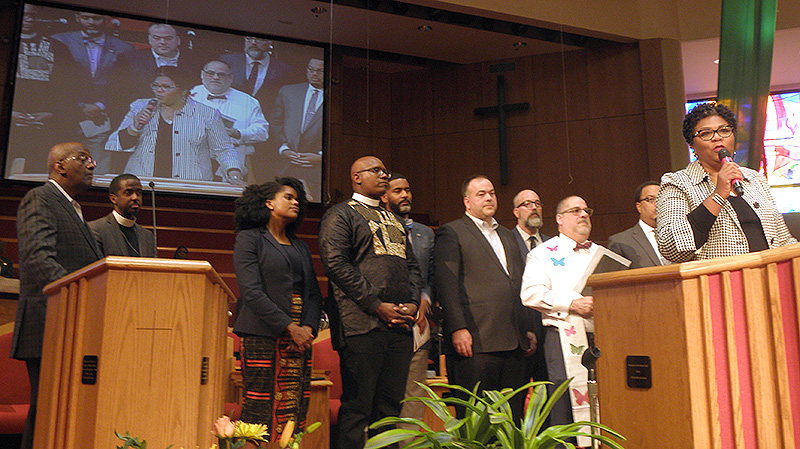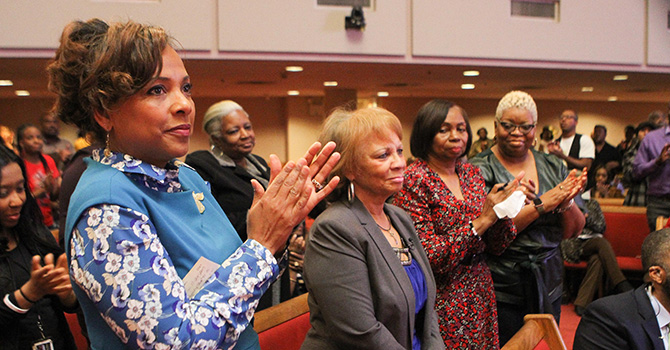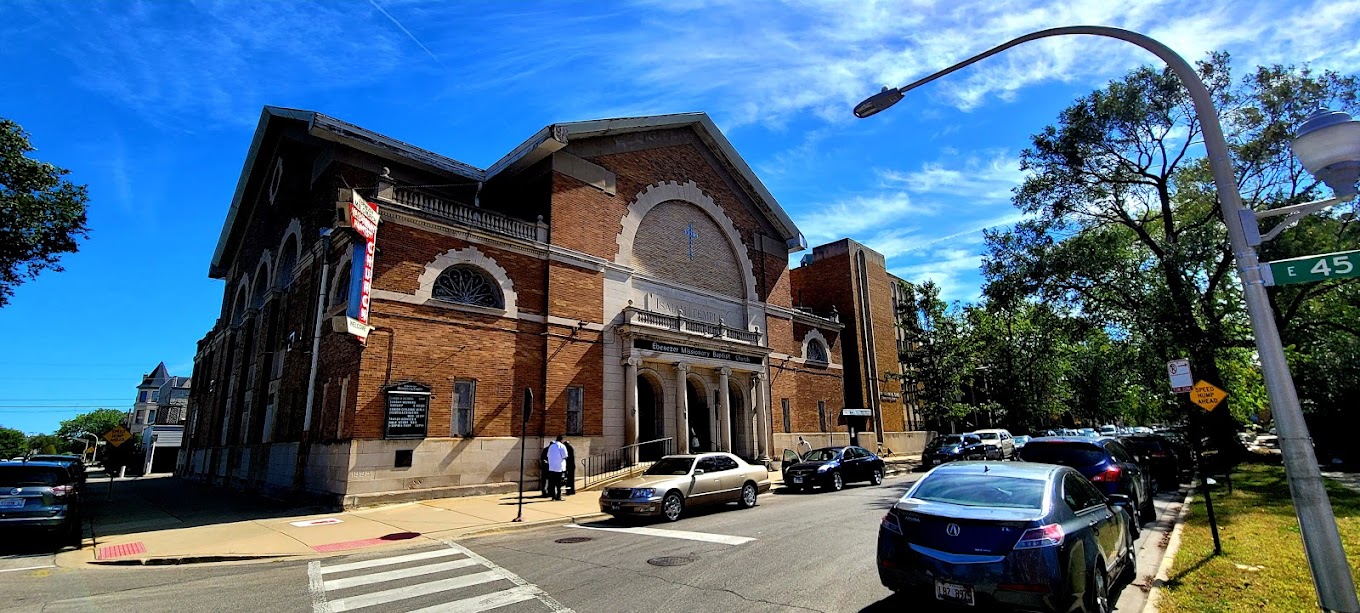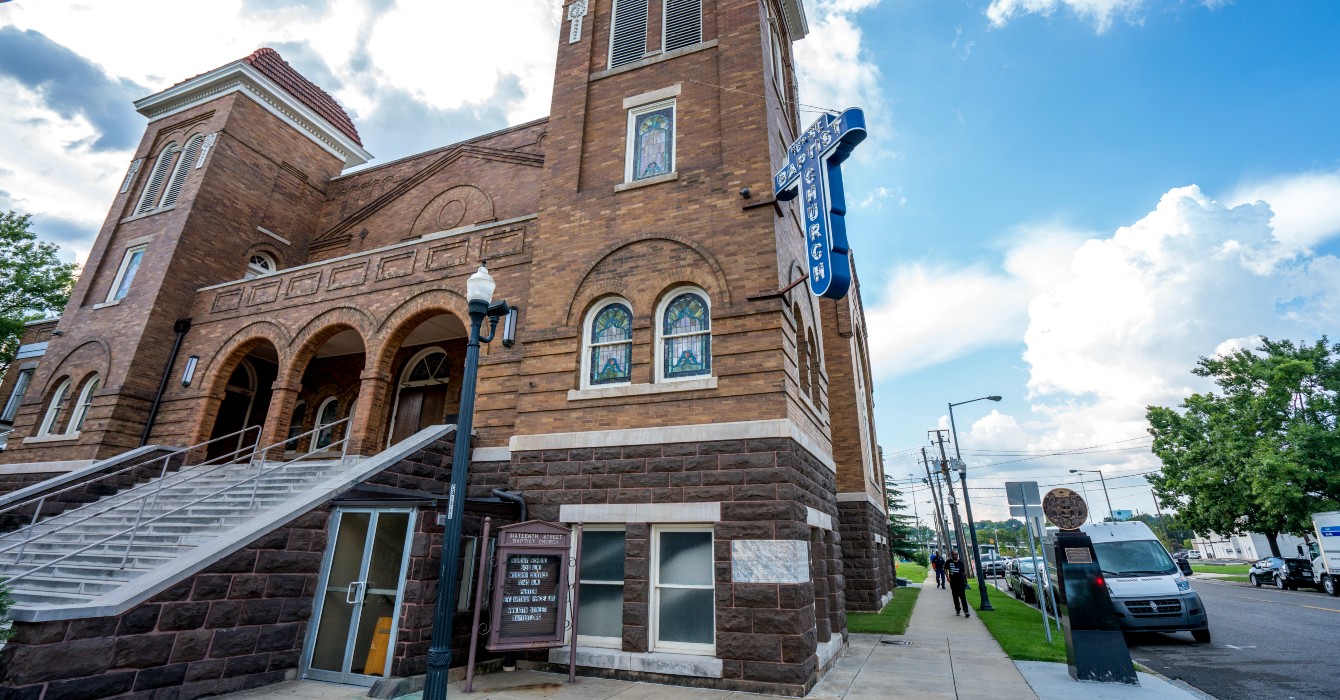Some pulled coins and small bills from pockets and purses to place into offering plates. Others wrote large checks and pooled funds. Together, a network of Chicago churches from several denominations wiped out $5.3 million in medical debt -- by raising only $38,000.
This fall, nearly 6,000 families received letters wishing them “a beautiful, wonderful holiday” and telling them their debt had been forgiven. While recipients might never enter the doors of the partnering congregations, which were listed in the letter, the churches erased their debt as an expression of God’s love, said the Rev. Traci Blackmon, the associate general minster for justice and local church ministries of the United Church of Christ.
The households had been identified as having especially burdensome debt by RIP Medical Debt, a New York-based nonprofit that cancels debt after buying it the way debt collectors do: for a fraction of the cost.
Health care providers and related companies sell medical debt at a discount if they aren't able to collect, and debt buyers then seek to collect as much payment on the debt as possible. Instead of engaging in that process, RIP Medical Debt uses donations to buy out the debt at the discounted price and forgive it.
Medical debt is a "wicked problem" throughout America. What are other wicked problems that could be addressed in similar ways?
Blackmon initiated the effort in the 800,000-member UCC denomination after reading a New York Times article about RIP Medical Debt last December. The idea of abolishing approximately $142 of medical debt for every $1 that the churches and the Illinois Conference of the UCC raised appealed to Blackmon, she said, “because it’s not just about charity but about justice.”

“The hospital is one of the few places in this nation where you don’t know the cost of the bill when you come out,” Blackmon said. “You get this horrendous bill, when you had no say-so, no options.”
A fresh start
Working with RIP Medical Debt cancels debt permanently and unconditionally, with no adverse effects on recipients’ taxes, according to the organization. The positive effects are numerous: increasing people’s credit scores, housing options and job possibilities, Blackmon said.
“It’s a new opportunity and a fresh start,” she said. “That, for me, is what grace is all about.”
The beneficiaries are not only the recipients of debt cancellation but also those who are giving “in a way that is in line with what Christ is calling us to do,” Blackmon said. “Helping others transforms oneself and one’s sense of discipleship.”
Since the organization began, RIP Medical Debt has wiped out over $964 million of medical debt.
Earlier this year, she talked with the Rev. Otis Moss III, the senior pastor of the denomination’s largest congregation, Chicago’s Trinity UCC, about the idea of canceling medical debt.
Moss took up two special collections in his 8,500-member congregation, which is self-funded by tithes and offerings, contributing approximately $12,000 to the total.
He told the congregation it would be an opportunity to assist “the poorest of the poor, those who have been disinherited, who have been disenfranchised.” In addition to the neighborhood on the South Side where Trinity is located, the area where people had debt wiped out includes the neighborhoods of Englewood, West Englewood, Pullman and Roseland.
“People were elated to participate and ecstatic when I announced how much debt we were able to forgive,” he said. “Everyone felt they were part of this effort, as opposed to a small group or small sector of ministry.”
Who are your partners at a local or regional level? What organizations, like RIP Medical Debt, could you work with to address other issues?
The church had another opportunity to rejoice when they heard from one of the recipients. Carol Edwards, whose mother had died with outstanding medical debt, was surprised and moved when she received the letter, Moss said. The debt held by Edwards' mother met RIP Medical Debt's criteria to qualify for being canceled, which Edwards could have been responsible for as next of kin.
In gratitude for the initiative, Edwards donated the amount of the canceled debt to Trinity’s food ministry to help feed families after Thanksgiving, addressing the systemic problem of food insecurity.
She attended worship at Trinity on Nov. 24, when the sermon was focused on “breaking idolatry with radical generosity,” Moss said. Moss invited Edwards to the front of the sanctuary, and worshippers gave her a standing ovation.

In fundraising to erase the medical debt, Moss built a coalition of churches in the city and suburbs with other UCC pastors and the Leaders Network, an ecumenical organization on the West Side that includes Baptist, Methodist, Lutheran, Pentecostal and nondenominational churches. He asked each congregation to give any amount between $500 and $3,500; the UCC denomination would provide matching funds.
When Moss told the Rev. Ira Acree, co-chairman of the Leaders Network board, that the coalition’s fundraising was going to pay more than $5 million in debt, “that was unfathomable to me,” Acree said. Then Moss explained, “We can buy this amount of debt for pennies on the dollar.”
“When we announced that we were going to help, many people felt really good about it, even though many in the pews probably had debt themselves,” Acree said. “People have their own financial challenges but are willing to help people under this kind of financial stress.”
Two-thirds of U.S. bankruptcies result from medical debt.
His church plans to buy and wipe out medical debt again, perhaps twice a year.
“This is an example of the abundant life of Scripture being revealed,” he said.
The right thing
In the spring of 2019, Moss reached out to the Rev. Matt Fitzgerald, the senior pastor of St. Pauls United Church of Christ.
The congregation was started by German immigrants, and its 1,000-plus membership is majority white. They had conversations on race as part of a strategic planning process a couple of years ago, Fitzgerald said, and several lay leaders suggested making a pledge to become more diverse in their partnerships “and then see where that takes us.”
Being part of the coalition of churches abolishing medical debt was one way to fulfill that commitment.
Fitzgerald noted the toll that stress from debt takes on people’s health and their families’ well-being.
Who in your community or congregation is struggling with medical debt? How could your congregation help support them?
“When an aggressive debt collector on a medical debt is breathing down your back, a person has the impression that they’re going to need to make a choice between rent or a mortgage payment and this debt,” Fitzgerald said. “I’ve seen people be hounded by this, but I didn’t really appreciate the evil of the whole enterprise until this experience.”
RIP Medical Debt looks for medical debt from households falling into at least one of three categories: those whose income is less than twice the federal poverty level, those whose debt is 5% or more of their annual income, and those whose debt exceeds their assets.
Craig Antico, co-founder of RIP Medical Debt, worked for several decades in the financial industry, including in debt buying and collections. His partner and co-founder, Jerry Ashton, also worked in debt buying and collections.
In 2011, the two were introduced to an organization that wanted to draw attention to the issue of crippling debt by buying it from collectors in order to cancel it. In 2014, they decided to start RIP Medical Debt in order to continue and expand those efforts.
“I closed my collection agency and went on this social entrepreneurial track,” Antico said. “I had to go to my pastor and my friends in church and see if I was doing the right thing. … Now I think I did the right thing.”
The desire to help
As of Dec. 3, RIP Medical Debt has wiped out $964 million of especially burdensome medical debt. It has done that mostly with individual donations of less than $300.
Antico and Ashton haven’t solicited donations from congregations or other faith-based organizations, but after information about their nonprofit spread by word-of-mouth and through the media, a wide variety of congregations began to contact them.
RIP Medical Debt buys debt for an average of 1% of what it’s worth -- a $100 donation buys $10,000 of debt.
RIP Medical Debt has now worked with nearly 100 congregations, and churches working with them forgave more than $250 million in debt in 2019. Antico has seen a high level of enthusiasm in their giving, as well as a commitment from pastors to be transparent with congregants about where the money is going.
“There’s a lot of pent-up desire to help,” he said. “It really galvanizes the congregation.”
There are many reasons people in need don’t receive charity care -- free or reduced-fee services -- and advocacy efforts could seek to change policies to ensure that people living in poverty aren’t saddled with medical debt in the first place, Antico said.
Blackmon called the Chicago efforts “a sacred launching pad” for continued debt abolition. UCC leaders set a goal of $50,000 to erase an estimated $5 million in medical debt in targeted regions across the country on Giving Tuesday, Dec. 3. The denomination’s Council for Health and Human Service Ministries, which includes UCC-affiliated hospitals, pledged $15,000.
UCC leaders exceeded their goal of $50,000 to erase an estimated $5 million in medical debt in targeted regions across the country on Giving Tuesday, Dec. 3. Donors had given more than $87,000 as of December 9.
What is the role of faith in changing the American health care and insurance systems? How does your theology inform the way that you think about these things?
In this fundraising, the UCC has not sought any grants or major donors outside the denomination. It plans to continue raising funds from its nearly 5,000 congregations, 38 conferences and affiliated organizations to buy and then abolish medical debt each quarter until at least its next national gathering, General Synod 2021.
Blackmon and other UCC leaders also plan to hold politicians accountable during the 2020 election for reforming health care.
“Health care costs are an equal-opportunity destroyer,” Blackmon said. “[This issue] cuts across race; it cuts across geography; it cuts across gender; it cuts across sexuality; it cuts across political parties.”
Questions to consider
Questions to consider
- Medical debt is a wicked problem throughout America. What are other wicked problems that could be addressed in similar ways?
- This story is one of effective regional partnerships working together to address a problem. Who are your partners at a local or regional level? What organizations, like RIP Medical Debt, could you work with to address other issues?
- Who in your community or congregation is struggling with medical debt? How could your congregation help them?
- About 66% of American bankruptcies result from medical debt. What is the role of faith in changing the American health care and insurance systems? How does your theology inform the way that you think about these things?



















